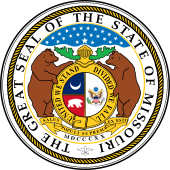| Macks Creek Law | |
|---|---|
 Seal of Missouri | |
| State of Missouri | |
| Enacted by | State of Missouri |
| Signed | 1995 |
| Introduced by | Delbert Scott |
| Amended by | |
| various changes in 2009, 2013, 2015 | |
The Macks Creek Law is the common name for a series of legislation passed by the US state of Missouri that limit the percentage of municipal revenues allowed from traffic violations. The first incarnation of the bill was put forward by Delbert Scott in response to a notorious speed trap on US 54 in Macks Creek, Missouri, and was enacted in 1995. An audit of Macks Creek in 1997 uncovered significant financial problems, and the city declared bankruptcy the next year. The voters of the city approved disincorporation in 2012. Ambiguous wording in the bill led to difficulties in enforcement, and in early 2009, the St. Louis Post-Dispatch reported that no excess revenues had been remitted under the provisions of the law. Amendments in 2009 and 2013 lowered the cap from 45% of general operating revenues to 30%, and the later amendment also resolved some of the ambiguities in the law's wording.
The 2013 amendment also contained a provision that would allow for the loss of municipal court authority, which led to a lawsuit from the Missouri Municipal League. Police ticketing procedures came under greater attention after the Ferguson unrest in 2014, and additional bills were passed that changed the law's procedures, which led to the prior lawsuit being dismissed. Those bills also reduced the cap to 20% in most of the state, with a 12.5% cap in St. Louis County. The lower cap in St. Louis County was struck down by the Missouri Supreme Court, and an attempt to reinstate it was denied in 2022.